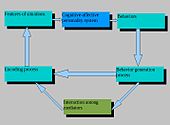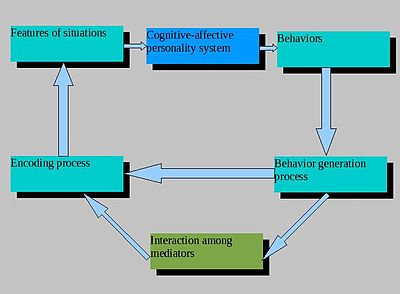- Cognitive-affective personality system
-
Cognitive-Affective Processing System 
Concepts
Cognitive-affective unit
Self-perception
Situation
Person-situation interactionProponents
Walter Mischel
Yuichi ShodaRelevant works
A cognitive-affective system theory of personality[1]Psychology portal The Cognitive Affective Processing System (CAPS) is a contribution to the psychology of personality proposed by Walter Mischel and Yuichi Shoda in 1995. According to the cognitive-affective model, behavior is best predicted from a comprehensive understanding of the person, the situation, and the interaction between person and situation[1].
Contents
Description
Cognitive-affective theorists argue that behavior is not the result of some global personality trait; instead, it arises from individual's perceptions of herself in a particular situation. However, inconsistencies in behavior are not due solely to the situation; inconsistent behaviors reflect stable patterns of variation within the person. These stable variations in behavior present themselves in the following framework: If A, then X; but if B, then Y. People's pattern of variability is the behavioral signature of their personality, or their stable pattern of behaving differently in various situations. According to this model, personality depends on situation variables, and consists of cognitive-affective units (all those psychological, social, and physiological aspects of people that allow them to interact with their environment in a relatively stable manner).
The authors identified five cognitive-affective units:
- encoding strategies, or people's individualized manner of categorizing information from external stimuli;
- competencies and self-regulatory strategies: intelligence, self-regulatory strategies, self-formulated goals, and self-produced consequences;
- expectancies and beliefs, or people's predictions about the consequences of each of the different behavioral possibilities;
- goals and values, which provide behavior consistency;
- affective responses, including emotions, feelings, and the affects accompanying physiological reactions.[1][2]
Evaluation
The cognitive-affective processing system theory provides a comprehensive view that accounts for both the variability of behavior and the stability in the personality system that generates it. Rather than dichotomizing personality research into the study of dispositions or processes, the theory allows the pursuit of both - structure and dynamics - as aspects of the same unitary system.[1][2]
See also
- Systems psychology
- Biospheric model of personality
- Hypostatic model of personality
- Personality systematics
References
- ^ a b c d Mischel, W. & Shoda, Y. (1995). A cognitive-affective system theory of personality: Reconceptualizing situations, dispositions, dynamics, and invariance in personality structure. Psychological Review, 102, 246-268.
- ^ a b Engler, Barbara (2008). Personality Theories. Cengage Learning. pp. 254-255. ISBN 978-0-547-14834-2.
Personality theories Biospheric model of personality · Cognitive-affective personality system · Constructivism (psychological school) · Distressed personality type · Ego psychology · Hypostatic model of personality · Nature versus nurture · Personal construct theory · Personality Assessment System · Personality systematics · Personology · Phenomenal field theory · Positive Disintegration · Psychological behaviorism · Self monitoring · Situationism (psychology) · Trait theory · Two-factor models of personality
Categories:- Personality theories
Wikimedia Foundation. 2010.



